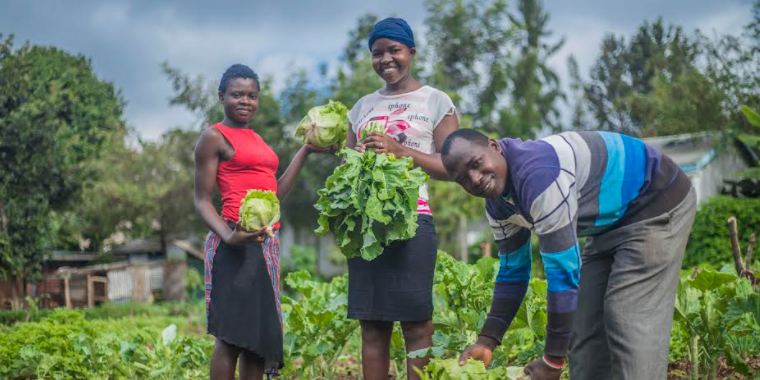Madison McDaniel, Feedback Labs | March 31st, 2022
Feedback practitioners can agree that feedback creates opportunities for change. It can break down barriers and create equal access to resources that marginalized communities might otherwise not have. To help drive this change forward, Thrive For Good presented at a recent LabStorm looking for feedback on ways to better position themselves to make an even bigger impact.
Thrive for Good is a nonprofit organization that works to empower communities to help eradicate extreme poverty. With 2 billion people – 33% being children – not receiving enough nutrients to reach their full potential and fight disease, Thrive aims to help communities grow Life Gardens so that a nutrient-dense diet isn’t out of reach for people living below the poverty line. Life Gardens are an essential part of Thrive’s work. The organization hosts five-day workshops to teach people how to grow healthy food and sustain those gardens for the future. Furthermore, Thrive provides training through the Thrive Institute so that community members and partner organizations can reach more communities and help create more access to healthy food.
Thrive aims to scale up and impact 50 times more people by expanding to six other regions around the world, certifying Growing Health Champions to provide outreach to more communities, and continuing to work within its existing network. By 2025, Thrive’s goal is to empower one million people to grow their own healthy food and eliminate the disparity in access to nutrition. With interviews, surveys, and site visits, Thrive has been able to garner feedback from the communities they seek to serve to better understand what tools are necessary to teach them to be sustainable and keep the project going.
After the Thrive for Good team’s presentation about their challenges and goals for the future, Labstorm attendees came to some recommendations.
Key Takeaways:
- Structure Thrive’s business model. Attendees suggested that Thrive individually price its services, which would allow its partner organizations to select which services best meet their needs. This flexibility would allow Thrive to reach more partners than a one-size-fits-all approach and could enable Thrive to meet its goal to reach more communities. However, to ensure that organizations are impacting communities the same way if they are only using parts of Thrive’s services, participants recommended that Thrive carefully consider how to show the data and outcomes of each project so that its partners can see the impact of their partnership. This would be important in maintaining the trust and support of current and prospective partners.
- Help other organizations recognize Thrive’s value. Currently, Thrive offers its partners a custom dashboard with monitoring and evaluation metrics for each project. LabStorm participants recommended that Thrive add community feedback data to its dashboard to assess and show the level of confidence that constituents have in Thrive’s work. This would be a great selling point for partners. Attendees suggested that Thrive segment its feedback data by partner organization to demonstrate the value of each relationship. Using open-ended feedback questions would allow Thrive to gather stories of impact about Life Gardens, which is another great way to make Thrive’s value clear. This will give organizations a fuller understanding of Thrive’s mission and its effects on communities.
- Use feedback to foster open, equitable, and effective partnerships. LabStorm participants shared that organizations look for transparency and openness in their partnerships. By receiving feedback on constituents’ wants, needs, and vision for their future, the organization can demonstrate its commitment to continual improvement, adaptation, and impact, and strengthen its relationship with partner organizations. Furthermore, it was suggested that as Thrive collects community feedback, the organization should find ways to make it easy for people to say “no” if its programming is not necessarily the help the organization or community wants. This allows room for transparency and honesty so that Thrive is an important foundation for effective, equitable partnerships.
With these suggestions from LabStorm attendees, Thrive for Good was able to walk away with a few more overall takeaways. They will be focusing on partnership offering and giving potential organizations options to use different services instead of them all. They will also be focusing on surveying the communities actually in the gardens eating the food and going over the feedback questions to make sure they’re effective. Additionally, Thrive will continue to quantify the benefits of the Life Gardens to show the value of its work and consider how to make sure organizations feel like they’re partnering with Thrive and not just paying for the organization’s services. Fostering these equitable relationships, both with communities and organizational partners, is an essential part of closing the feedback loop.
Learn More About LabStorms
 LabStorms are collaborative problem-solving sessions designed to help organizations tackle feedback-related challenges or share what’s working well in their practice.
LabStorms are collaborative problem-solving sessions designed to help organizations tackle feedback-related challenges or share what’s working well in their practice.
Presenters leave the experience with honest, actionable feedback and suggestions to improve their feedback processes and tools.
To learn more about participating in a virtual LabStorm, please visit feedbacklabs.org/labstorms.







